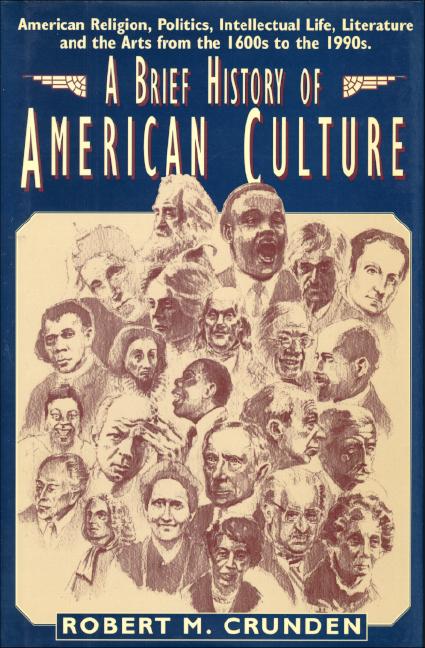“A first-rate overview of the subject. Crunden seems to be equally at home in all four centuries of American culture. A Brief History of American Culture is admirably sound and invariably interesting, and manages to avoid superficiality without yielding to eccentric judgments. It is a splendid achievement.”–Stephen J. Whitfield, Professor, Brandeis University
“A readable, insightful overview of the underlying patterns that give shape to U.S. cultural history.”–Booklist
“A short work devoted to thumbnail sketches
of individual thinkers and artists of note from John Winthrop to Saul Bellow,
containing brief descriptions of movements such as abolitionism and imagism.
It is full of interesting material and insights which are presented in
blessedly clear prose.”–Stephen S. Conroy, University of
Florida
“Culture can be a fighting word.” So begins Robert Crunden’s A Brief
History of American Culture, a sweeping portrayal of four centuries
of American culture, introducing the figures, movements, and ideas in a
work that seeks the core of American cultural progress, from colonial days
to ideological turmoil in 1992. “American culture,” he states “is essentially
a peculiar mixture of Christianity, capitalism, and democracy, in that
order.” It is a chronology with cumulative input, covering five historical
phases, analyzing the movements and spotlighting the major figures in politics,
philosophy, law and literature, economics and education; Crunden shows
how religion, capitalism, and democracy shaped the nation and how they,
in turn, were shaped by events and people.
The roots of today’s “culture wars” can be found in the molding tensions of an American character, one that wasn’t handed down by tradition or enforced by a government, but one that was shaped out of the mire of individuals, religious beliefs, communities, a newly formed democracy, capitalism and freedom, art and literature all prominently influencing the vast and uncharted young nation.
The important cultural centers from 1630-1815–Boston, Philadelphia, and Virginia are highlighted through figures like Benjamin Franklin, “the rustic sage.” An early America, “the playground of the European imagination,” began to form its own intellectual, artistic, and political culture, where fresh ideas about democracy, rationality, nature, a benign God, flourished and America became the place where “it could happen.”
As the country expanded westward, from 1815-1901, a revival of conservative religion burst upon the scene. Protestantism, Presbyterianism, Methodism, Baptists, even groups like the Episcopalians and Roman Catholics saturated the culture and profoundly influenced its institutions, especially education. Reformers like Horace Mann and Charles Finney, Transcendentalists like Henry Thoreau, Ralph Waldo Emerson and Theodore Parker and Uncle Tom’s Cabin by Harriet Beecher Stowe, all blazed the path toward abolitionism and supplied much of the energy to American cultural activity.
The Civil War became a dividing point in American culture in ways that transcended its social and political impact. Social development went through profound changes; Darwinism, progressivism, and pragmatism secularized the prevailing thought and religious energies were channeled into economic activity and then into a political faith.
In the early 1900s, cosmopolitanism turned American eyes to Europe, where many Americans experimented in art, literature, and philosophy: Gertrude Stein, Hemingway, Pound, and Eliot. And America initiated its own indigenous cultural growth: jazz, George Gershwin, Charles Ives, Aaron Copeland, William Faulkner, Frank Lloyd Wright, Eugene O’Neill. From 1941 to the present, America developed its own idealism, expressed in foreign policy, legal and political social policy, racial integration and civil rights, religious and moral activism, artistic and literary innovation.
Crunden traces the pivotal figures who influenced the modem culture: William F. Buckley, the emergence of a conservative intellectual force; Arthur Schlesinger, the disintegration of liberalism; author T. Coraghessan Boyle, the crucial act of betrayal in the modem world; and John Cage (America’s first performance artist) the evolution of modernism into post-modernism. America emerged as a citizen of the world, recognizably American, sophisticated and popular.
Puritan Revolutionaries, Transcendentalists, Quaker Abolitionists, political figures, writers, artists, and scientists who they were and what they believed are vividly described. Biographies of major figures are woven into the text so their significance–both to their time and to American culture as a whole–is clear. James Fenimore Cooper, Washington Irving, Benjamin West, Edgar Allen Poe, Harriet Beecher Stowe, William Cullen Bryant, John Audubon, Alice Hamilton, W.E.B. DuBois, Louis Armstrong, Bessie Smith, George Gershwin, Henry James, and Gertrude Stein are among the dozens included.
Conveying the legacy of our country’s collective power of innovation,
Crunden sounds a wake-up call for contemporary Americans to forge new paths
with ideas to empower our cultural future.
ROBERT M. CRUNDEN is professor of history at the University of Texas at Austin and author of A Hero In Spite of Himself and Ministers Of Reform: The Progressives’ Achievement in American Civilization.






